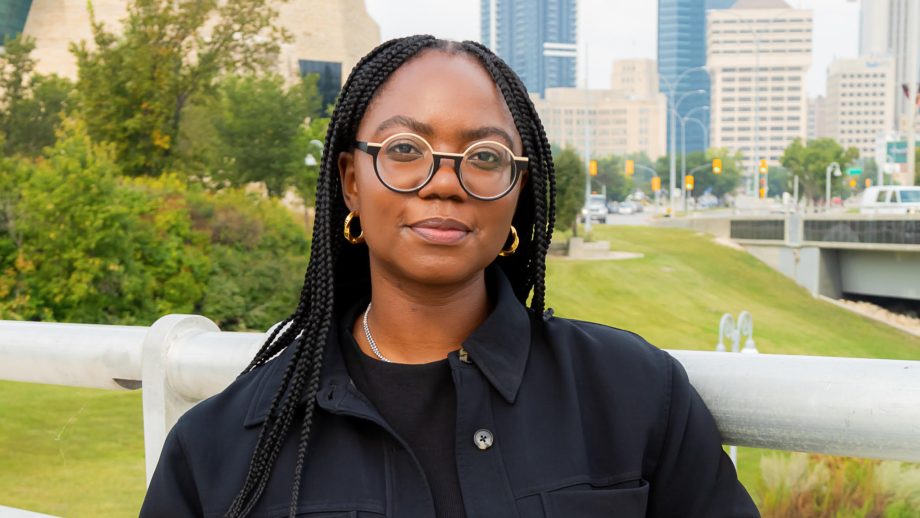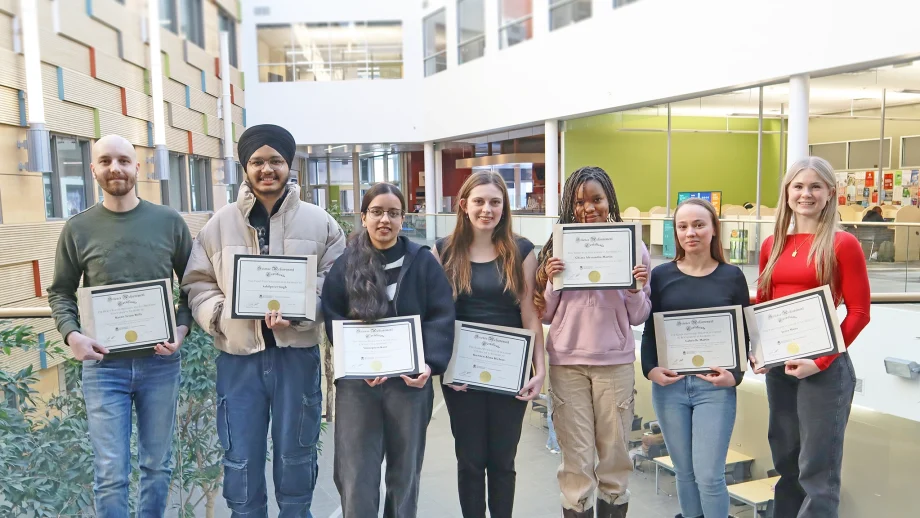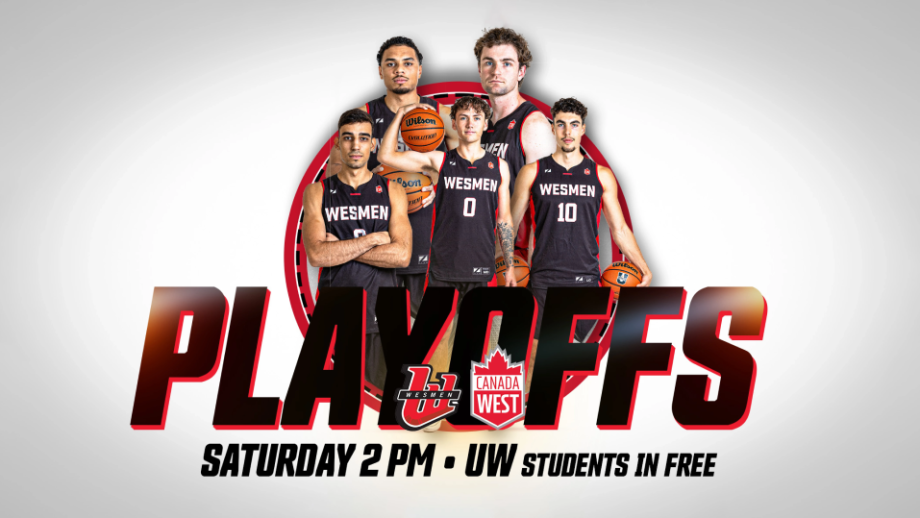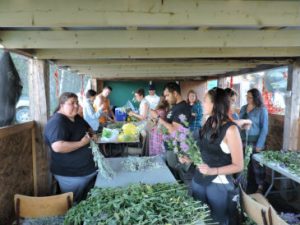
Learning about plants – photo supplied
Indigenous Ethnobotany – July and August
Shailesh Shukla, Indigenous Studies
Pre-requisite: IS-1015, IS-3012/ANTH-3170 or permission of Instructor – and love for plants!
After very encouraging response from students in last three years, this course is offered for a fourth year. Students participate and learn about the 50 medicinal, nutritional and cultural uses of plants from Indigenous perspectives and knowledges in and around Keeseekoowenin from Elders. This land-based course offers an exciting opportunity to study the multiple dimensions (such as medicinal, ceremonial, aesthetic, and subsistence) in the use of plants by Indigenous communities in Manitoba along with the botanical identification and knowledge of these plants. See Video: https://www.youtube.com/watch?v=BcEoUnS_dlM&t=208s
Course Code: IS- 3201: Indigenous Ethnobotany Field School
Classroom: July 24 to 28, and Aug 8-11
Field: July 31 to Aug 3, at Medicine Eagle Lodge, Keeseekoowenin First Nation
Those interested can contact:
Department Assistant: Vanessa Kozak at 204-786-9305 ( v.kozak@uwinnipeg.ca )OR Shailesh Shukla at 204-786-9761 -(s.shukla@uwinnipeg.ca)
Emerging Issues in Human Rights (Global College) – August 8 to 18
Senator Marilou McPhedran*
This intensive course introduces students to local and global human rights challenges and opportunities, and their implications for global citizenship. We examine the voices, perspectives, and actions of individuals working for human rights – globally and locally, based in Manitoba. This 6 credit ‘jump start’ course is for students entering university for the first time and provides an opportunity to get to know university life and university-level academic requirements in a supportive learning environment. First year and upper year students learn from each other, as well as from the wide range of experts who lecture in this diverse course to focus on ‘lived rights’.
*Born and raised in rural Manitoba, called to the Bar of Ontario, named a Member of the Order of Canada (1985) in recognition of her co-leadership in the successful campaign for stronger gender equality protections in the Canadian constitution and appointed to the Senate of Canada by Prime Minister Justin Trudeau in 2016, Marilou McPhedran is a lawyer and educator who specializes in teaching and developing systemic and sustainable change mechanisms to promote equality and diversity. She co-founded several internationally recognized Canadian organizations, such as LEAF – the Women’s Legal Education and Action Fund, which has conducted constitutional equality test cases and interventions for 30-plus years, METRAC – the Metropolitan Action Committee on Violence Against Women and Children, and the Gerstein Crisis Centre for homeless discharged psychiatric patients. She founded the International Women’s Rights Project in 1998 and the Institute for International Women’s Rights at UWinnipeg’s Global College in 2009.
COMPLETED The University and the Public Good – May 1 to May 12
Dr. W. Rory Dickson, Assistant Professor, Religion and Culture
This course is open to all UWinnipeg students as an upper-level seminar course: pre-requisite is 6 credit hours in Religion & Culture courses.
The University of Winnipeg’s 50th Anniversary presents the campus community with an ideal moment to reflect back on 50 years of higher education, and to chart its course moving forward. To assist in this process, the CLASS Spring Institute will explore the relationship between the university and the public good. With roots in medieval religious institutions in South Asia, the Middle East, and Europe, universities have long sought to engage the various elements of the human experience, ranging from theology and philosophy, to music, medicine, and law. In their more recent, secular iterations, universities have preserved the ideal of a broad-minded education with liberal arts traditions. Recently however, political suspicion of and even hostility towards the liberal arts and social sciences have raised pointed questions regarding the purpose of the university. Speakers from around the world will help us consider the purpose of the university in general, and in particular draw our attention to the role of institutions of higher learning in fostering a social climate of rights, reconciliation, and collective conscience, while pursuing research that furthers critical thought, sustainability, and public health.
Course Code:
REL-3940/4940-001 The University and the Public Good.
This course is also open to all graduate students via course number GDP 7791-001.
COMPLETED Sustainable Energy for Northern Development – in collaboration with the Norwegian University of Science and Technology (NTNU) – May 1 to May 12
Dr. Patricia Fitzpatrick, Associate Professor, Department of Geography and Instructor, Master’s of Development Practice – Indigenous Focus (Geography); Claire Reid, Director, Master’s in Development Practice; Dr. Andriy Verlan, Associate Professor, Manufacturing & Civil Engineering NTNU; other instructors to be announced.
This course is offered to senior undergraduate and Master’s students. The pre-requisite for undergraduate students is GEOG 1102(3) or GEOG 1103(3) or permission of the instructor. The pre-requisite for graduate students is admission to the MDP or permission of the instructor.
This course focuses on sustainable energy in two Arctic nations: Norway and Canada. Students will explore energy policies against the themes of sustainable development, energy justice, human rights, Indigenous worldviews and approaches to development, and community resilience. New alternative energy initiatives carried out in collaboration with Indigenous peoples will also be discussed. This course builds on the partnership UWinnipeg has formed with the Norwegian University of Science and Technology (NTNU), a three year project funded by the Norwegian Centre for International Cooperation in Education. The course will be delivered by faculty from both the UWinnipeg and NTNU.
In addition to the May 2017 Spring Institute, a field school to Churchill in 2018 is in development and funding is available for up to 20 students to travel between countries to participate in energy-related research activities as part of thesis projects or project courses between now and November of 2018. Students will work with at least one supervisor from UWinnipeg and one supervisor from NTNU in Gjovik once they have selected a particular project. The goal is to provide students the opportunity to take on applied projects that allow them to gain international experiences and opportunities to work with faculty from different institutions
Course Codes:
GEOG 3511 Topical Regions
GDP 7791 Sustainable Energy for Northern Development (Special Topics In Indigenous Development)
Course Scheduling:
The course is scheduled in the studio Monday, May 1 to Friday, May 12; from 5:30-8:30 pm (Monday to Friday). Students can either come to class during this time, OR be off- campus downloading the lectures as per the usual studio course.
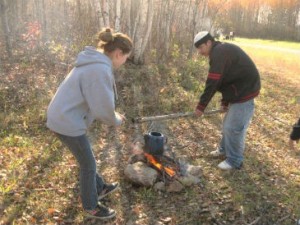
Indigenous food photo by Gerald Mason
COMPLETED Indigenous Food Systems – May 15 to May 31
See the students in action at Fisher River Cree Nation – May 2017
Shailesh Shukla (Indigenous Studies)
Students will visit the Fisher River Cree Nation and learn about Indigenous food systems, challenges and opportunities. Students will learn from Elders and band council members, for example: goose plucking, cleaning and preparing a goose and traditional food teachings from elders and community members. They will also participate in open fire cooking, community gardening and basic fishing and other land-based learning activities. Offered for the first time in 2016, students completed a Participatory Video Project, now available on YouTube: https://youtu.be/F8pwbyoE8WM
Classroom: May 15 to 18 and May 30 and 31
Field: May 23 to 26 at Fisher River Cree Nation
Course Code: IS- 2001: Indigenous Food Systems Field Course
Pre-requisite: IS-1015 or special permission of Instructor
Those interested can contact:
Department Assistant: Vanessa Kozak at 204-786-9305 ( v.kozak@uwinnipeg.ca) OR Shailesh Shukla at 204-786-9761 (s.shukla@uwinnipeg.ca)
COMPLETED Indigenous Ceremonies and Healing – May and June 2017
Dr. Mark F. Ruml (Religion and Culture)
This is a 3000/4000 year course, also open to graduate students
Organized in collaboration with local healers, this course involves attending and participating in local Indigenous ceremonies and learning about Indigenous healing models and worldviews. Combined with an academic pedagogical approach, it provides an opportunity for students to engage in experiential learning from an Indigenous pedagogical approach, which engages the four aspects of the self (mind, body, spirit, emotions) in the learning process.
Offered in spring, when several major ceremonies are held, it allows for overnight camping. Students use their experiential learning as a framework from which to engage written sources related to the ceremonies and teachings. In preparation for attendance and participation in ceremonies, students demonstrate an understanding of Indigenous research methods and ethical issues related to research with Indigenous people, as well was an awareness of protocols related to interacting with Elders and attending ceremonies. Higher expectations are placed on students enrolled at the 4000 and graduate levels.
Participation requires a high degree of commitment to the course. A large portion of participation grades will be earned through attending the field trips (to the Petroform in the Whiteshell and Sundance).
Classes are held on campus on Tuesdays and Thursdays in May (10:00-1:00). We will be going to the Bannock Point Petroforms on a Saturday in May. We will camp out at the Spruce Woods Sundance on the June 9-11 weekend. Our closing circle in class will be on June 13.
Course Code:
REL-3805/4805 (6) (730)
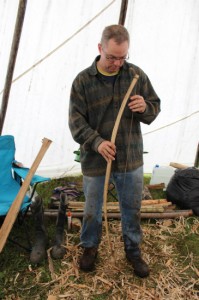
Dr. Roland Bohr with his nearly completed bow, photo supplied
COMPLETED – Material Culture in Northern Plains Indigenous History – July 2017
Dr. Roland Bohr, Professor, Department of History, offered through the Winnipeg Education Centre, Access Program
Based on oral history, archaeology, and material culture, students in this course explore ways in which Indigenous and European technologies complement each other. The second half of the course moves from classroom to the ANPO-Bison Ranch, near Rossburn, Manitoba, where students have an opportunity to work with Indigenous Elders from nearby First Nations communities.
MEDIA CONTACT
Diane Poulin, Senior Communications Specialist, The University of Winnipeg
P: 204.988.7135, E: d.poulin@uwinnipeg.ca

